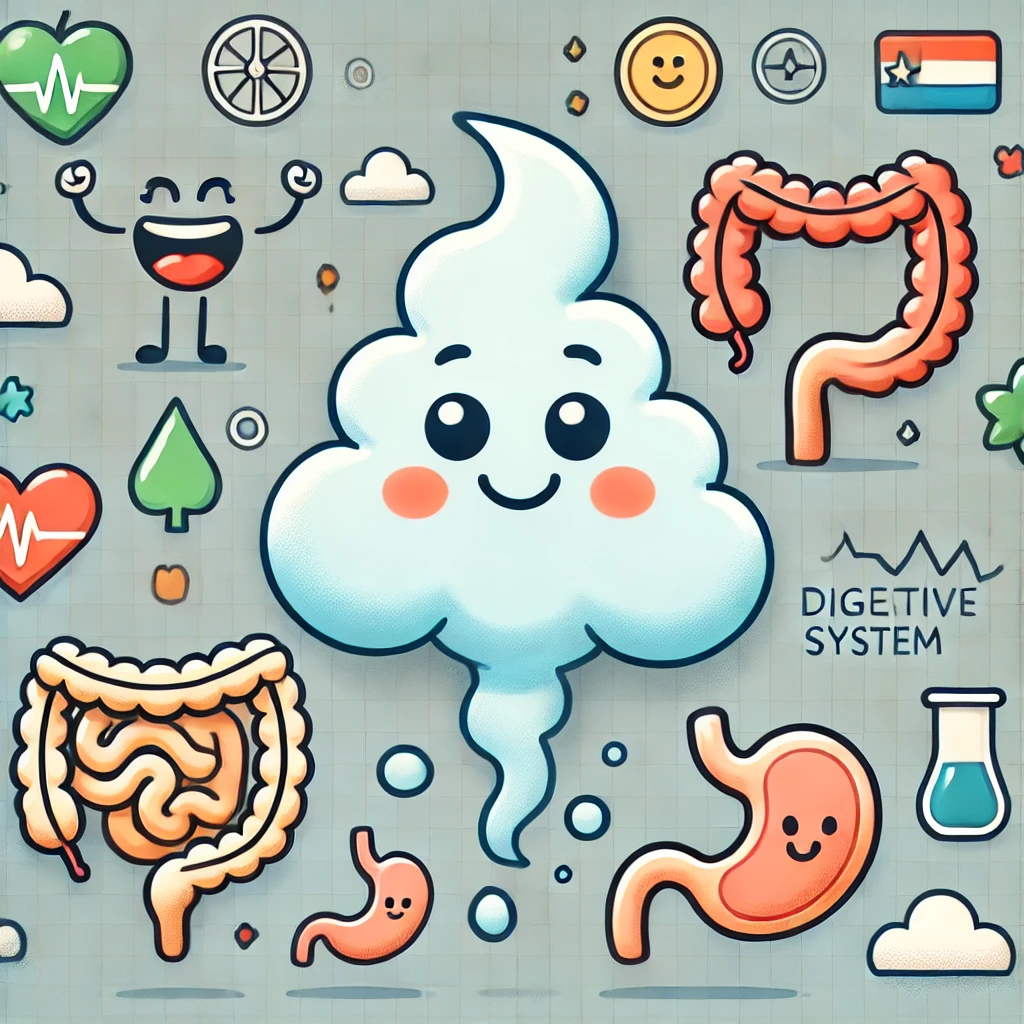Let’s face it: farting isn’t just funny, it’s natural. In fact, the average person farts about 15 to 20 times a day! While it may seem like an embarrassing topic, farting is a normal part of digestion and can even offer clues about your gut health. The good news? Embracing your gas can lead to better digestive health and even help prevent uncomfortable bloating or indigestion.
In this post, we’ll break down the basics of farting, what it says about your digestive system, and how you can use fart tracking to improve your gut health. Ready to get serious about your gas? Let’s dive in!
Why Do We Fart? Understanding the Science of Gas
Farting (also known as flatulence) is the process of releasing gas that builds up in your digestive system. This gas comes from two main sources:
- Swallowed Air: When you eat, drink, or chew gum, you swallow air. This air can build up in your digestive tract and eventually needs to be released – often as a burp or fart.
- Gas Produced by Digestion: Certain foods, especially those high in fiber, are broken down by bacteria in your large intestine. This process produces gases like carbon dioxide, methane, and hydrogen, which eventually need to be released – and you guessed it, that’s where farts come in.
Embrace Your Gas: Why Farting is a Good Thing
As much as we might try to avoid it, farting is actually a sign that your digestive system is working. Here’s why:
- Digestive Efficiency: Farting shows that your gut is breaking down food and moving it through your digestive tract. If you’re farting regularly, it means your system is functioning normally.
- Healthy Gut Bacteria: Many farts are caused by fermentation in your gut, where healthy bacteria break down complex carbohydrates. This fermentation process helps keep your gut healthy, aiding in digestion and the absorption of nutrients.
- Bloating Relief: Farting can help relieve bloating caused by the buildup of gas. If you’ve ever felt uncomfortably full after a meal and let out a big fart, you know exactly how much better it can make you feel!
So, the next time you feel embarrassed about farting, remember that it’s your body’s way of keeping things moving and healthy.
How to Track Your Farts for Health Insights
Did you know that tracking your farts can give you valuable insights into your digestive health? By paying attention to when and how often you fart, as well as the smell and volume, you can start to notice patterns that reveal how your body reacts to different foods and lifestyle factors.
Here’s how you can get started:
1. Frequency: How often do you fart in a day?
- If you’re farting more than 20-30 times a day, it could be a sign that your digestive system is working overtime. Common culprits include eating too fast, consuming high-fiber foods, or swallowing too much air.
2. Smell: What do your farts smell like?
- While some level of smell is normal, foul-smelling farts could indicate that your body is having trouble digesting certain foods, like those high in sulfur (e.g., eggs, meat, or dairy).
3. Volume: Are your farts loud or quiet?
- Loud farts are often caused by swallowed air or carbonated beverages, while quiet but smelly farts are typically linked to the digestive breakdown of certain foods.
4. Timing: When do you fart the most?
- Are you farting more in the morning or after meals? Noticing when gas builds up can help you identify foods or habits that are triggering your flatulence.
The Personal Fart Tracker: Your Tool for Better Digestive Health
If you’re ready to get serious about tracking your farts, FartRanker’s Personal Fart Tracker makes it easy to log and analyze your gas. Whether you’re tracking for fun or for health, the Fart Tracker allows you to log:
- Fart frequency (How many farts you let out in a day).
- Smell intensity (Rate your farts on a scale from “barely noticeable” to “clear the room”).
- Volume (Is it a thunderclap or a silent but deadly?).
- Triggers (What foods or habits are linked to your farts?).
Using the Personal Fart Tracker, you can start spotting trends in your farting patterns and get insights into how your diet or lifestyle might be affecting your gas production. Over time, this can help you make small changes to improve your digestive health – while having a little fun along the way!
Practical Tips for Reducing Excess Gas
If you’re noticing more gas than usual, or if your farts are causing discomfort, here are some easy tips to help reduce excessive gas:
1. Eat Slowly and Chew Thoroughly
Eating too quickly can cause you to swallow extra air, which leads to more gas buildup. Slow down your eating, and chew your food thoroughly to help your body digest it more efficiently.
2. Watch Your Fiber Intake
While fiber is great for digestion, too much of it can lead to extra gas. Foods like beans, broccoli, and whole grains can cause more fermentation in the gut, so try introducing them into your diet gradually to reduce gas.
3. Avoid Carbonated Drinks
Sodas, sparkling water, and beer are loaded with carbon dioxide bubbles, which can cause you to burp or fart more often. If you’re trying to cut down on gas, stick to flat beverages like water or tea.
4. Get Moving After Meals
Light exercise, like going for a walk, can help move gas through your digestive system more quickly, preventing it from building up and causing bloating.
5. Consider Over-the-Counter Remedies
If your gas is caused by specific foods, over-the-counter remedies like Beano (for beans) or lactase supplements (for dairy) can help your body break down those foods more efficiently and reduce gas.
Why Tracking Your Farts Can Lead to Better Health
Tracking your farts might sound funny, but it can provide important clues about your digestive system. Here’s why it works:
- Spotting Food Sensitivities: If you’re noticing more gas after certain meals, you might be able to identify food intolerances (like lactose intolerance or gluten sensitivity) that could be affecting your digestion.
- Improving Gut Health: By tracking your farts, you’ll start to understand how fiber, carbohydrates, and other food components interact with your digestive system, helping you make adjustments for a healthier gut.
- Reducing Bloating and Discomfort: Armed with insights from the Fart Tracker, you can make small tweaks to your diet or eating habits that reduce bloating, discomfort, and gas buildup.
Start Tracking Your Farts Today with FartRanker!
Curious about what your gas is trying to tell you? The Personal Fart Tracker makes it easy to start logging your farts and seeing the bigger picture. Whether you’re tracking for health or for fun, understanding your flatulence can help you improve your digestive health and reduce uncomfortable gas in the future.
Click here to start tracking your farts with FartRanker’s Personal Fart Tracker and get insights into your gut health!
Conclusion:
Farting is more than just a funny sound – it’s a sign of a healthy digestive system. By embracing your gas and using tools like FartRanker’s Personal Fart Tracker, you can learn more about your gut health and make small changes to improve how you feel. So the next time you let one rip, remember: your body’s just doing its job!



Ah, the art of farting—such a noble subject that deserves its moment in the sun! Let me take you back to a particularly memorable evening with my dear friends last summer. We gathered around a grill, our bellies full of burgers, beans, and just a pinch of that delightful corn on the cob. As the sun set, creating a picturesque backdrop, the air was filled with laughter, and perhaps, an unsung hero—gas.
You see, when the first trumpet sounded, I thought it was just my buddy Tim adjusting his chair. However, the guilty grin on his face told a different story. The room erupted in laughter, and I had my very own lightbulb moment—gas is nothing to be ashamed of! It’s practically a form of self-expression!
As the night continued, the chorus of farts swelled like an off-tune symphony. Someone dropped the bean dip, and let me tell you, it took a mere whiff to recognize that this was no ordinary gathering. With each gust of wind, we embraced our gas in a way I’d never imagined possible. Each toot was met with applause, and the more we giggled, the more liberated we became. In fact, I think we found a hidden talent—fart-fueled stand-up comedy, if you will!
Now, my digestive health may not have been in peak condition that night, but honestly, does it ever really stand a chance against a plate of 12-layer nachos? Yet, I learned an important lesson: embracing our gas can bond us as friends. It’s not just a sign of digestion at work; it’s a signal that we’re all in this together, even if it means clearing the room faster than a fire drill!
So, the next time you feel the pressure building up, remember Tim, the champ from that night. Let it rip! After all, gas is simply your body’s way of reminding you that it’s working hard. And who knows? Maybe you’ll start your own flatulence comedy club! Just be sure to always bring a couple of air fresheners and—no beans for tacos when company is near!